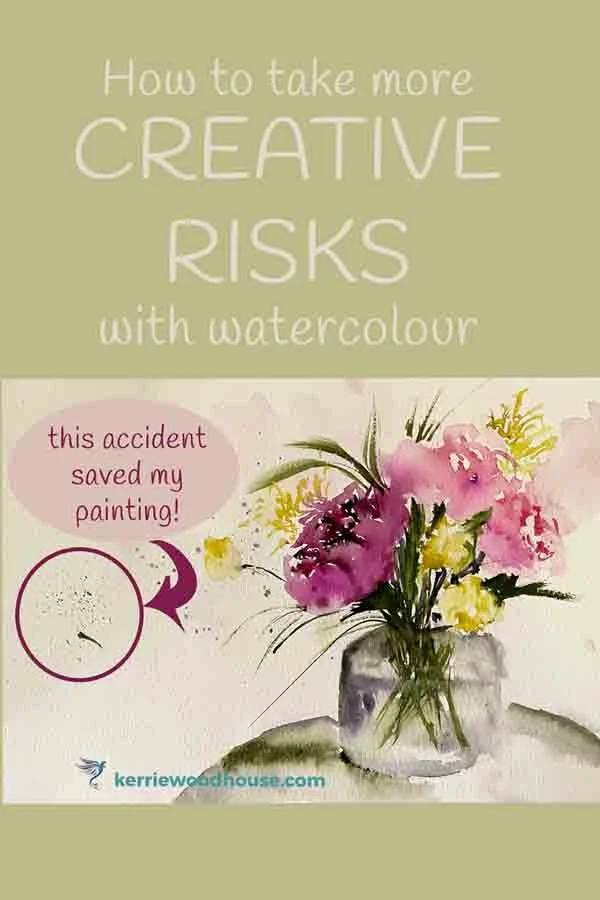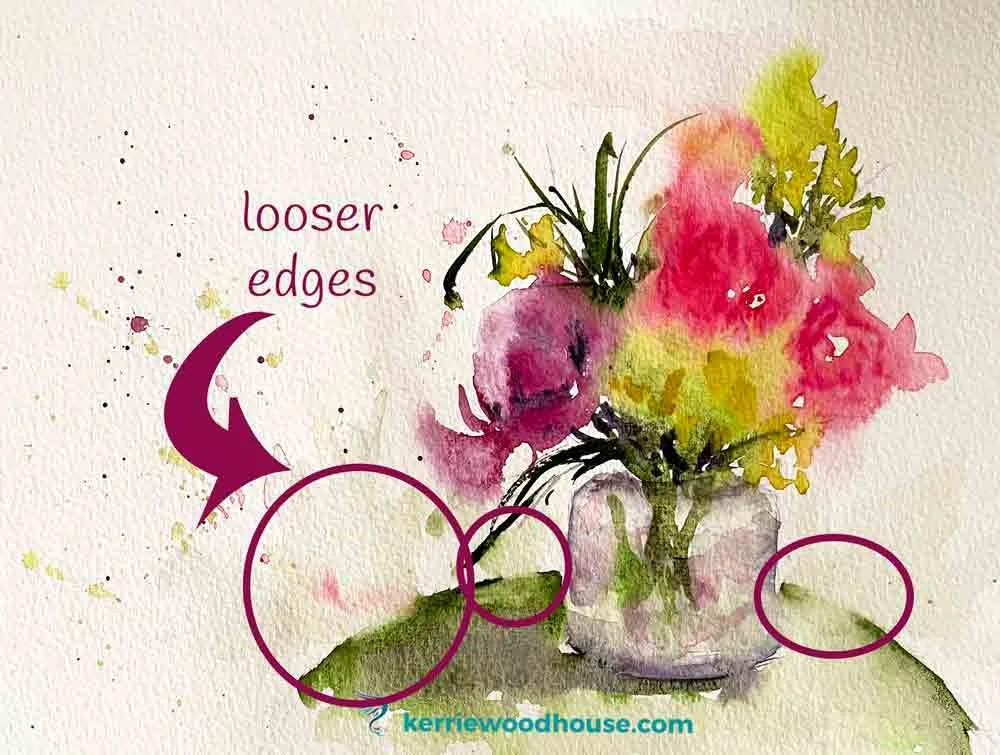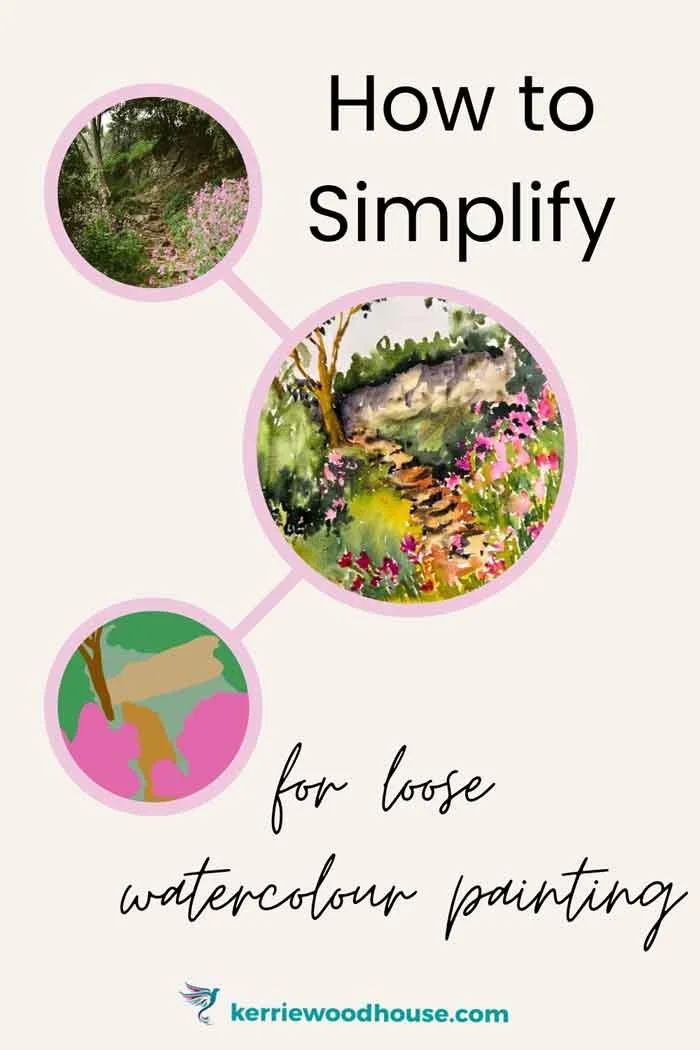How to Embrace Creative Risks in Watercolor Painting
Sometimes you get to the end of a watercolour painting and you see a few things you would like to have done differently.
But watercolour is a tricky thing and you can’t try to fix things, can you?.....
Wrong!
Of course you can!
And actually, I think you should - here’s why.
Listening to your intuition is the gateway to greater confidence in your creativity. Experimenting will build your trust in your own painting abilities. So let’s talk about how you can take a few more creative risks in your watercolour painting.
It is true that you have to exercise a little care in making changes to a dry painting because you can end up with extra cauliflowers and backruns if you add too much water to your dry painting. And it is true that unlike opaque media you cant really paint light colours over dark. You might be able to do a little lightening by using techniques like lifting and blotting but those are not the sort of changes I am talking about.
I'm talking about the dilemma of wondering whether you will ‘ruin’ your painting by adding your changes.
Will the things you have in mind make things worse?
If you have spent a bit of time creating the painting and there are parts you are happy with is it best to just let it be?
Oh, I have a lot to say about all this.
Firstly, its a very normal part of the process and if you have these thoughts - go, you! It means you have really grasped the idea that painting is simply a series of problem solving exercises. But let’s think about some of the language here. It’s very natural and the way that most of us think in our heads I’m sure. But it is full of fear and judgement.
These things, while natural, are not helpful when we are relaxing with our paints.
I do think that if you have an idea of something you would like to try, go right ahead. If it ruins the painting so what, really? It was fun to paint and you can just paint another one. Also, take a quick snap of it with your phone so you still have a version of it before you made your changes.
There is so much value in following your creative urges. Especially when they are the quiet whispers. Its a way of letting your little inner creative voice feel safe and heard - and that will make that little voice speak up more. We should have our own backs when it comes to our painting. Be our own supportive champions. The question is not really will this ruin my painting… but rather what happens if I do this?
It’s simply something to investigate, an avenue to explore. Either way you will learn something from the process.
One of the biggest lessons watercolour tends to teach us is to let go of control. A perfect reminder for those of us challenged by perfectionism! I was reminded of this while I was painting a floral series with my members of the Happy Painters Hub. My express intention with this series was to try to loosen up and have a little more fun. The strange thing is, the more I tried to ‘loosen up’ the tighter my floral paintings seemed to be.
And then I accidentally dropped my brush and splattered green paint on the left of the painting.
This was most definitely a happy accident.
There is nothing like a bit of accidental splatter to instantly release that tension which I think is just a form of perfectionism.
It has taken me a while to acknowledge that, since I never aim for hyperrealism in my paintings - that’s just not appealing to me. In my mind, this means I must automatically not be a perfectionist. But I don’t think that’s true.
Even perfection is subjective it seems.
I suppose I am looking for a ‘perfectly loose’ painting. Even in a loose style I must have some sort of expectation to make marks in a certain way. But if I really think about it, what I actually want is to paint freely and express what I find to be lovely in the florals I choose to paint.
That sort of free expression comes more from the feeling heart than the thinking mind.
An accidental splatter of paint is marvellously effective at retiring that thinking mind for a bit so that the feeling heart can come out to play.
After this accident, I created a floral I was much happier with. But once I was finished I kept looking at the edges of the table I had painted and wishing I had left a few of those edges open in places. I so love a lost edge in a painting!
This was the point at which I asked myself the question I posed above:
Is it too late to do that now?
Will I ruin what I have?
Even after all the years I have spent painting, these concerns still arise. But luckily now I have learned that allowing myself to experiment is a very good idea.
With a clean damp brush I loosened some of the edges of the table letting the colour spill out. Yes, I like that better.
And it reminded me that lost edges are something I find so pleasing. So in the next painting I did, I let the left hand edge of the white vase be completely lost against the white background.
You don’t need to articulate every single edge of an object in your painting for the viewer to understand what they are looking at. The amazing thing about our eyes and brains is that they complete any missing information.
I think this is one of the ways to make a painting engaging.
Any time spent manipulating your paints on the page and playing with the colours you have in your paintbox will stand you in good stead for the next painting. It builds your confidence. It also helps you let go a little more and be a bit less precious about each painting.
That is the sort of liberating attitude that not only makes painting more fun, but also results in better paintings. Grant yourself the right to make a total mess and trust that you are just practicing your problem solving.
In the spirit of play, you are at your most creative.
Trust the process and let yourself follow those little ideas even if they sound a little wild… in fact, especially if they sound a little wild.
Are you on your own painting journey?
One of these might be useful…












